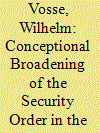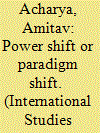|
|
|
Sort Order |
|
|
|
Items / Page
|
|
|
|
|
|
|
| Srl | Item |
| 1 |
ID:
187215


|
|
|
|
|
| Summary/Abstract |
This article argues that the focus of the still nascent Indo-Pacific “security order” should be extended from traditional, predominantly maritime, security concerns to include information and cybersecurity. This reflects the growing awareness that the global and regional security order is increasingly undermined by information technology and an AI duopoly. Therefore, it is necessary to broaden the concept “security order” to “cyber security order” with the aim of defending and strengthen a liberal order through cooperation in joint investment, technology exchange, and capacity building. Japan and Europe, which have long been strong defenders of international norms, have both broadened their security focus to include the Indo-Pacific, having recognized the gradual political shift towards this region. Their shared concern is that information and communication technology (ICT) can be used by governments and major technology companies to undermine democratic principles. Through several joint agreements the EU and Japan have not only deepened their mutual strategic cooperation, but they consider the protection of a free and open cyber security order in the Indo-Pacific as their joint endeavour.
|
|
|
|
|
|
|
|
|
|
|
|
|
|
|
|
| 2 |
ID:
131007


|
|
|
|
|
| Publication |
2014.
|
| Summary/Abstract |
This essay proposes a new theoretical framework for analyzing the rise of China and its impact on Asian security order. While the rise of China is reshaping Asia's military balance, the region has also witnessed equally important and longer-term changes, especially economic interdependence, multilateral institutions and domestic politics. The implications of these changes are not fully accounted for by the different types of security orders proposed by analysts to describe the implications of China's rise, such as anarchy, hierarchy, hegemony, concert, and community. This essay presents an alternative conceptualization of Asian security order, termed consociational security order (CSO) that draws from different theoretical lenses: defensive realism, institutionalism, and especially consociational theory in comparative politics. Specifying the conditions that make a CSO stable or unstable, the essay then examines the extent to which these conditions can be found in Asia today. Aside from offering a distinctive framework for analyzing China's rise, the CSO framework also offers an analytic device for policymakers and analysts in judging trends and directions in Asian security.
|
|
|
|
|
|
|
|
|
|
|
|
|
|
|
|
| 3 |
ID:
188861


|
|
|
|
|
| Summary/Abstract |
This preliminary study focuses on the change in the regional security order caused
by the U.S.–China competition and its impact on South Korea–Japan relations. The
ongoing U.S.–China relations has expanded beyond the discussion of cooperation
and competition between existing and emerging powers, as well as the debate
over the influence and resilience of the U.S.-led liberal international order. The
significance of the U.S.–China competition in the security order in East Asia
depends on whether China will accept the existing U.S.-led bilateral alliance system
and take a status quo attitude. As a result, the U.S. allies, South Korea and Japan,
need to respond sensitively to the changing nature of the security order. In this vein,
this study explains the East Asian security order as elements of power structure,
institutions, and actors. In addition, it explains the emergence of China as a new
hegemonic power due to the U.S.–China competition, the hub-and-spokes system
changes according to the U.S. rebalancing policy, and the emergence of Trumpism.
Through this, the author argues two claims. First, the change in U.S.–China
relations has led to different expectations between Seoul and Tokyo for cooperation
with the U.S., which has hindered bilateral cooperation between them. Second,
divergent views on China also hinder South Korea–Japan cooperation. Through
the Senkaku dispute between Japan and China and the missile deployment dispute
between South Korea and China, the two countries later showed different directions
in their policy toward China. In the current competitive situation, restrictions on
South Korea–Japan relations are inevitable. However, if the opportunity to promote
security cooperation between South Korea and Japan is sought, it will be able to
show the cooperation of middle power countries that can develop the security order
to mitigate the intensity of U.S.–China competition.
|
|
|
|
|
|
|
|
|
|
|
|
|
|
|
|
|
|
|
|
|